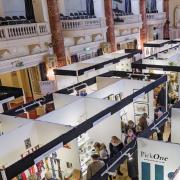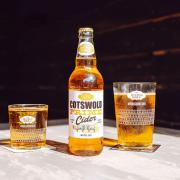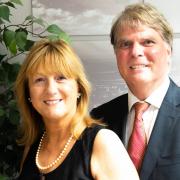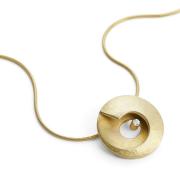Apart from the wheel of course, innovations that very often make the biggest difference to our quality of life are medical and these started in earnest only around 100 or so years ago (X-ray was discovered in 1895, penicillin in 1928).
Big medical discoveries deliver a step change in the way we fight disease and infection, but there are thousands of small innovations making a big difference to people’s daily lives, and some are made by Woodstock-based Owen Mumford. In fact one of its inventions reputedly saved the life of a Hollywood actress.
Owen Mumford is a fast-growing medical device design and manufacturing company. In the last 5 years it’s grown 60% in an expanding market sector with ambitions to match and it wants to double the size of the business by 2020.
Ivan Owen and John Mumford, who still sit on the board along with their sons, started making anaesthesia equipment and laryngoscopes in 1952 and it was their Oxford Inflating Bellows (apparently essential life saving equipment on aircrafts at the time) that reputedly saved Elizabeth Taylor’s life when she became ill in flight.
Like Miss Taylor’s life, Owen Mumford had its ups and downs and has reinvented itself a number of times including, for a short time, making Christmas decorations for Woolworths. But such low-tech products were not to be its future.
Managing director since 2008, Jarl Severn, takes up the story. “In the 1960s we made everything from medical and automotive components to plastic decorations, but it was a low margin business and we were capable of much more, so Owen Mumford changed strategy to focus almost entirely on producing medical products which require a high degree of quality and compliance with regulation and it’s something we’re good at. Today, our products carry over $10 billion of drugs a year. Although, we are comparatively small in some respects, we are a very important part of the supply chain of the world’s pharmaceutical industry.”
The company’s ‘iPad moment’ happened in 1977 when, in conjunction with two local diabetes specialists, it designed and manufactured a lancing device that for the first time allowed diabetics to monitor their blood glucose levels by taking blood samples from their fingers rather than relying on less accurate urine samples as had been the case. The company discovered a huge market for products to help those with diabetes (and its designers were later to receive a British Design Council award for their device). In the 1980s Owen Mumford launched the Autopen, a portable pen-like device that carries a cartridge of insulin.
Today, Owen Mumford has a large Research & Development team, filing patents every year and regularly coming up with new product ideas that are sold under the Owen Mumford brand and other pharmaceutical partners’ names for which the products have been custom designed and manufactured.
Owen Mumford products are in over 90% of all UK hospitals but export is its big opportunity and it has sales companies in Germany, France, the US and now, China. “We need local people creating local business for us,” explains Jarl. “America has a hugely competitive US retail pharmacy sector which is always looking for something new. We were in the US when Autolet, our original ‘finger-pricking device’ was a novelty and we’ve come up with one innovation after the other.”
In 2012 the company opened an office in Shanghai, China and is looking at other regions. “We see China not for cheap manufacturing but as a source of excellent new business opportunities for us to sell to,“ says Jarl.
There is healthy scepticism over domestic manufacturing standards of food and medical consumables among the informed Chinese middle class, with a history of extreme examples when things go wrong, and though China is fast driving up standards at home, British brands are still perceived as high quality and are in demand.
Owen Mumford manufactures everything in Woodstock and Chipping Norton, but would it consider manufacturing in China? “The biggest cost of manufacturing is typically the cost of direct labour,” says Jarl. “In our case, direct labour represents just 15% of the manufacturing cost. The greater cost lies in the infrastructure needed to support a highly regulated industry.
“We have over 50 development engineers and 50 people in quality and regulation. However, if demand in Asia were to increase substantially, we might consider sourcing local production facilities specifically to supply Asia, because it can take a month for goods to get from Woodstock to Shanghai.”
Owen Mumford’s OEM’ (Original Equipment Manufacture) arm designs and manufactures custom products for some of the world’s top pharmaceutical and diagnostic companies and the business has diversified into other areas, including veterinary. Last year it produced the world’s first insulin pen for cats and dogs.
Jarl and his wife, 21-year old son and 17-year old daughter live locally and when he’s not working he likes to play golf, but he doesn’t get much chance: “This job is full-on and I travel a lot. Next week Barcelona, then Mexico, China, Malaysia and Brazil to generate opportunities. Britain is no longer the world’s top travelling nation.
“The Germans, Dutch and Danes are pushing their wares around the world and we are not always there. We have the ability to punch above our weight and I think we could do it a lot more.
“I look at Free Trade Zones when I am considering our global business. If the UK was not in European Union, would I look at setting up a factory here and trade? No, though I understand why people are concerned about Europe’s influence over us. In China, Thailand and Malaysia, they don’t have a common currency or argue about the shape of bananas but they do have a free trade area, the original intent of the European Economic Community.”
What keeps Jarl awake at night? “Currency. 90% of what we make is exported and if the pound strengthens considerably our profits disappear. We can talk about efficiency, productivity and tax relief but if we are at $2 to the £1 rather than $1.50, we lose a quarter of our dollar revenue stream overnight. It is one of the big factors our nation doesn’t talk about much, but it’s the single biggest variable and probably the hardest to manage.”
Which brings us back to innovation, the life-blood of Owen Mumford. Currency issues are easier to fight if you’ve got superior products to sell. The business began in the aftermath of two World Wars when the country was trying to pull itself out of debt and we’re doing it all over again, but Owen Mumford has 60 years’ experience putting British-made goods in the world’s hospitals and pharmacies.
Interview by Nicky Godding



























